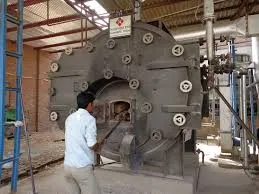
Сен . 07, 2024 02:25 Back to list
Understanding the 3 Types of Boilers
Boilers are essential equipment in many industrial and residential settings, providing heat and hot water through the conversion of fuel into energy. There are several types of boilers, but they can generally be categorized into three main types fire-tube boilers, water-tube boilers, and electric boilers. Each type has its unique design, benefits, and applications, making them suitable for different industries and needs.
1. Fire-Tube Boilers
Fire-tube boilers are among the most common types used in industrial and residential applications. In this design, hot gases produced by combustion pass through tubes that are surrounded by water. The heat from these gases is transferred to the water, producing steam or hot water for various purposes. Fire-tube boilers are known for their simple construction, ease of operation, and maintenance.
These boilers typically have a relatively large water capacity and can produce steam quickly, making them suitable for applications where high steam demands exist. They are also generally more compact than water-tube boilers, which allows for easier installation in constrained spaces. However, fire-tube boilers have limitations in terms of pressure and efficiency, making them less suitable for high-pressure applications.
Water-tube boilers, as the name suggests, have water contained in tubes, which are heated externally by the combustion gases. This design allows for higher pressures and better efficiency compared to fire-tube boilers. Water-tube boilers can produce steam at higher temperatures and pressures, making them ideal for industrial processes that require large amounts of steam.
what are the 3 types of boiler

One of the advantages of water-tube boilers is their ability to respond quickly to changes in demand. They can also maintain efficiency over a wide range of loads, providing flexibility for various applications. However, the construction is more complex than fire-tube boilers, which may lead to higher initial costs and more demanding maintenance requirements.
3. Electric Boilers
Electric boilers use electricity as their primary energy source to generate steam or hot water. They operate by converting electrical energy into heat, which is then used to heat water. Electric boilers are compact, efficient, and environmentally friendly since they produce no emissions on-site. They are particularly useful in applications where natural gas or other fuels are not available or where emissions regulations are strict.
Despite their advantages, electric boilers have limitations in terms of output capacity and operating costs, especially in areas with high electricity rates. They are typically used in smaller applications, such as residential heating or low-capacity industrial processes.
In conclusion, understanding the differences between fire-tube, water-tube, and electric boilers is crucial for selecting the appropriate boiler type for specific applications. Each type has its strengths and weaknesses, making it essential to evaluate the requirements carefully before making a choice. By considering factors such as efficiency, steam production capacity, and operating costs, one can ensure that the best boiler is chosen for the intended application.
-
How to Maintain a Steam Boiler Expert Tips for Efficiency & Longevity
NewsApr.29,2025
-
Professional Steam Boiler Service AB Expert Maintenance & Repair
NewsApr.29,2025
-
Hot Water Steam Boilers Efficient Heating Solutions & Expert Tips
NewsApr.29,2025
-
Hot Water Boiler Capacity Calculation Guide Efficient Design Tips
NewsApr.28,2025
-
How to Drain a Steam Boiler Step-by-Step Safety Guide
NewsApr.28,2025
-
How to Install a Hot Water Boiler Optimal Pressure & Efficiency Guide
NewsApr.28,2025
Related PRODUCTS






















